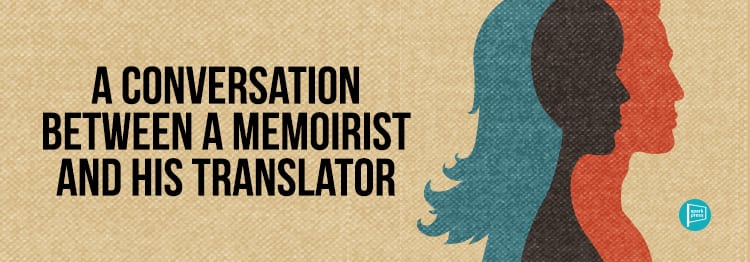
A Conversation Between a Memoirist and His Translator:
Elie Paul Cohen and Jessica Levine Discuss
“Mission Afghanistan: An Army Doctor’s Memoir”
Jessica: Why don’t we begin with how this project started?
Elie: How did it start anyway?
Jessica: I was living in Paris in 2014-15 and looking for an English-speaking doctor for myself and my family.
Elie: It was January 2015, right after the terrorist attack on Charlie Hebdo and the Jewish supermarket. You came to my practice and we started talking about politics, the situation of Jews in France, being secular Jews, and so forth.
Jessica: With our last names being Cohen and Levine, the “Jewish connection” had to come up!
Elie(laughing): Inevitably!
Jessica: You told me that you had served as an emergency doctor in Afghanistan, which piqued my curiosity. Then when our books came out at approximately the same time, we read each other’s work. I had translated books from French before, so when I finished your memoir, I thought, “This book needs to be translated into English.” And we got going on the project.
Elie: I was excited about being translated into English. It seemed crucially important to me that there be an English translation of my memoir. First, because I have dual nationality, French and British. Secondly, I was deployed by the French military with the British military and thus found myself in a war zone with British troops. Consequently, I wanted this experience to be accessible to the Anglophone world.
Jessica: Your point of view as a compassionate doctor in the middle of this war struck me as unique and valuable.
Elie: I felt it was important to bear witness to the sufferings of war from a perspective that was partly that of a civilian. Let me explain: I was not a career military man, I found myself entering the military late in life.
Jessica: A fifty-something-year-old man joining the Army. A bizarre story.
Elie: Yes, there was a rather surreal sequence of events that led to that decision. I’d been anti-militarist at the age of 20, but my youthful evasion of conscription came back to haunt me decades later. The French and British military needed someone like me for a special mission, and I ended up serving to pay off a debt I shouldn’t have had to pay in the first place.
Jessica: Why don’t you say something about the mission?
Elie: I was sent to study a set of life-saving protocols developed by the British and Americans, called Damage Control Resuscitation, which is used to stabilize critically wounded soldiers in the crucial moments right after an injury. I am talking about polytraumatized men who have lost one, two, or three limbs, and may also have suffered damage to their testicles and internal organs.
Jessica: A protocol that consists of—?
Elie: Addressing the lethal triad for the polytraumatized: coagulopathy, hypothermia, and acidosis.
Jessica: Everyone knows what hypothermia is. But what about coagulopathy, it would have something to do with blood clots, right?
Elie: Yes, coagulopathy is a bleeding disorder that affects the way the blood clots.
Jessica: And acidosis?
Elie: That’s when there’s too much acid in the body, as alkaline reserves are depleted. In Damage Control Resuscitation, we use these steps to fight the lethal triad: We stop catastrophic bleeding by putting tourniquets close to the wound and hemostatic dressings inside it; we treat pain with ketamine; then there are massive transfusions to compensate for blood loss. All this has to be done with utmost speed, within the first 10 minutes, which are called the “Platinum Ten.”
Jessica: This was an interesting translation project for me because it combined personal memoir with medical and military language. In the end, we were co-creators of the translated version, as I had to ask you many questions as we went along. We ended up reading the whole translation aloud to each other over Skype in order to get everything exactly right.
Elie: But you did the main job as the translator. You really respected the spirit of the French version. Huge and wonderful work.
Jessica: Thank you.
Elie: When I wrote the French version, I was very close to my experience. By the time we started working on the American version, I had obtained a little distance, and I had you to reflect the narrative back to me as a mirror while we worked to address a broader audience, mainly Anglo-Saxon. All this opened the way to refining the narrative a bit.
Jessica(teasing): So maybe the English version is just a tad better than the French one?
Elie(laughing): Maybe!
Postscript: Jessica and Elie are now working together on a screenplay version of “Mission Afghanistan: An Army Doctor’s Memoir”.

Leave A Comment